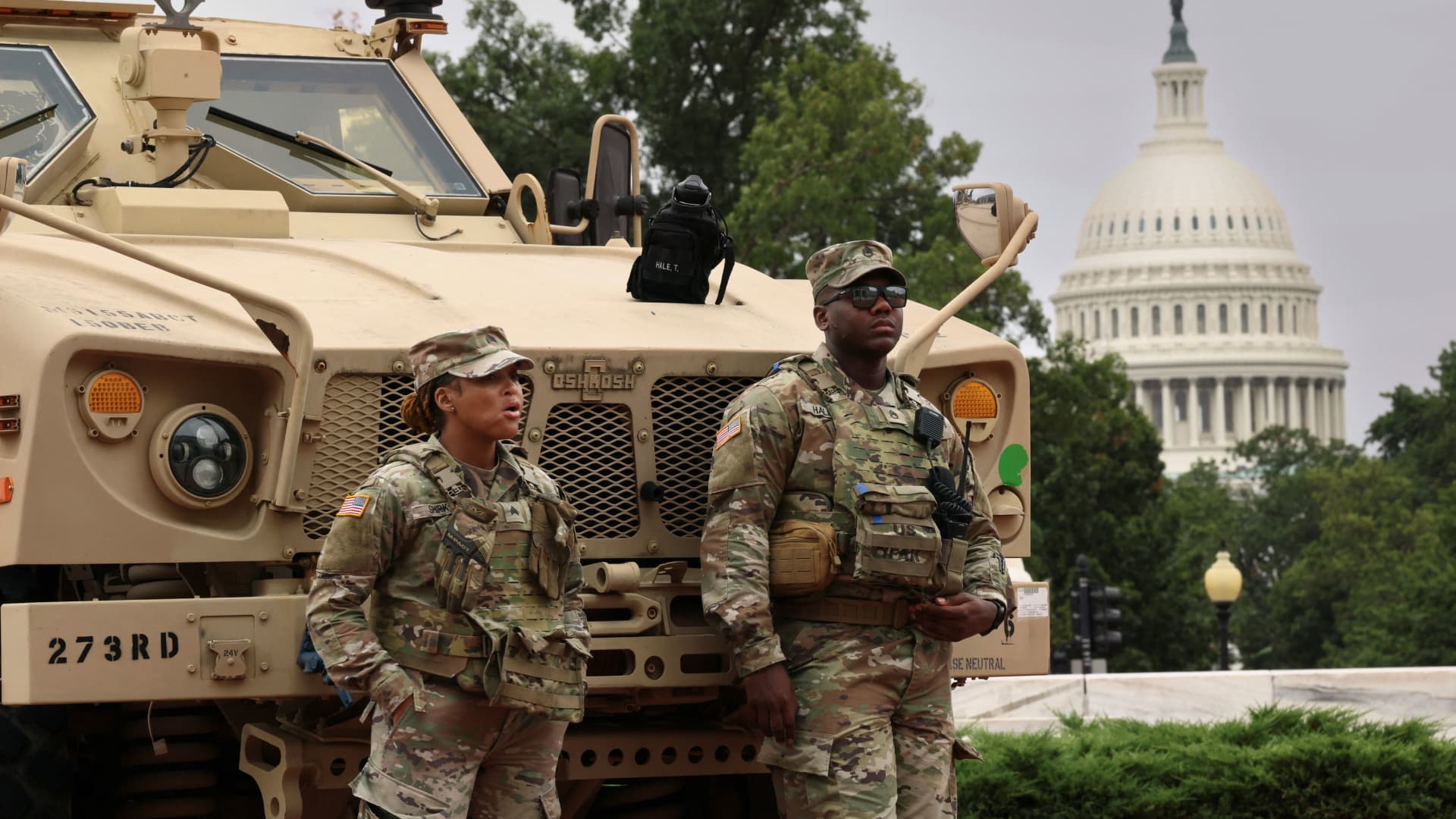With the dome of the U.S. Capitol in the background, members of the DC National Guard keep watch outside Union Station after U.S. President Donald Trump deployed the National Guard and ordered an increased federal law enforcement presence to assist in crime prevention, in Washington, D.C., August 19, 2025.
Kevin Lamarque | Reuters
Washington, D.C., on Thursday sued the Trump administration over its deployment of hundreds of National Guard troops to the capital city’s streets, arguing that the move violates the Constitution and federal law.
President Donald Trump “has run roughshod over a fundamental tenet of American democracy—that the military should not be involved in domestic law enforcement,” D.C. Attorney General Brian Schwalb wrote in the federal lawsuit.
“These unprecedented, unlawful actions have subjected the District to serious and irreparable harm,” Schwalb wrote.
The suit names Trump and the heads of the Pentagon, the Department of Justice, the Army and the U.S. Marshals Service, as well as their respective departments, as defendants.
D.C. wants a judge to issue a permanent injunction against Trump’s troop deployment.
The suit comes two days after a federal judge barred Trump from deploying the National Guard to Los Angeles to enforce the law in California.
White House spokeswoman Abigail Jackson said in a statement that the lawsuit “is nothing more than another attempt — at the detriment of DC residents and visitors — to undermine the President’s highly successful operations to stop violent crime in DC.”
Trump “is well within his lawful authority to deploy the National Guard in Washington D.C. to protect federal assets and assist law enforcement with specific tasks,” Jackson said.
Trump on Aug. 11 put the D.C. police department under federal control and deployed hundreds of National Guard troops to the city as part of his crackdown on crime in cities across the nation.
Trump invoked a section of D.C.’s decades-old Home Rule Act that gives the president powers over the district’s police force in an emergency.
That statute specifies that the president’s control expires after a maximum of 30 days, unless Congress passes a law authorizing an extension.
The National Guard troops, meanwhile, could stay in the city through the end of the year, an official said earlier this week.
In the weeks since Trump’s announcement, the total number of National Guard troops has swelled to roughly 2,200, according to Schwalb’s lawsuit.
Trump’s efforts to deploy the military in U.S. cities hit a legal snag earlier this week, when federal Judge Charles Breyer blocked Trump from deploying the National Guard and other troops to conduct law enforcement in California.
The decision in U.S. District Court in San Francisco was limited to California, and is stayed until Sept. 12, but it still dealt a blow to Trump’s unprecedented efforts to deploy federal law enforcement to cities.
Trump has said he is also considering deploying National Guard members to Chicago and other cities across the country.
“We’re going in. I didn’t say when, but we’re going in,” Trump told reporters at the White House when asked if he will send troops to Chicago.
While D.C. residents mostly oppose the deployment and Democrats have broadly condemned Trump’s actions, the city’s Democratic mayor, Muriel Bowser, has walked a more delicate line.
She has criticized the National Guard’s presence in D.C., but has also credited the deployment with reducing crime.
“We think there is more accountability in the system, or at least perceived accountability in the system that’s driving down illegal behavior,” Bowser said Wednesday.





